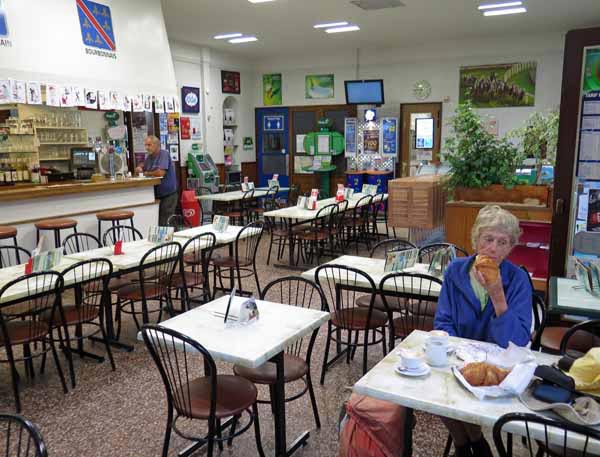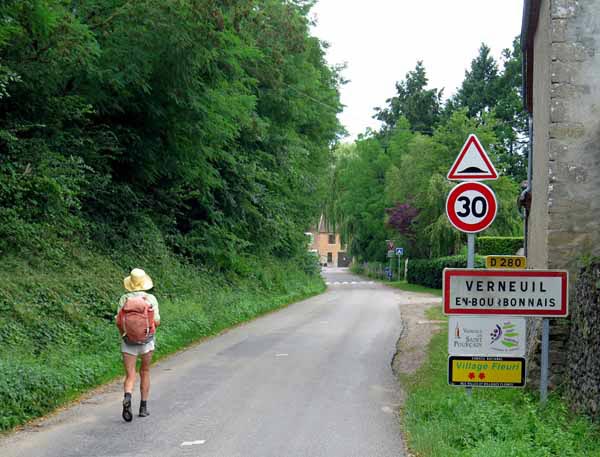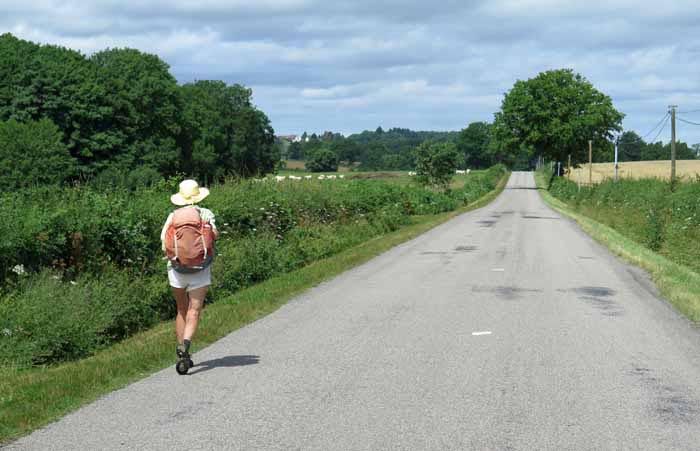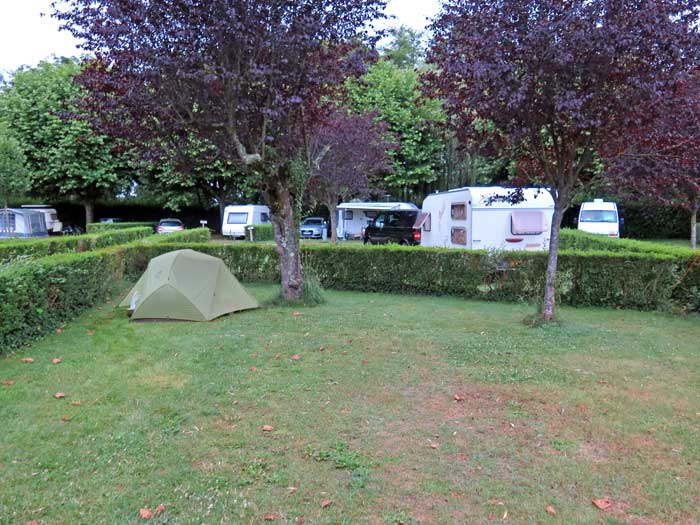
Tuesday, 11 July 2017
Distance 28 km
Duration 5 hours 30 minutes
Ascent 348 m, descent 161 m
Map 141 of the
We had found out the previous evening that the Café du Cours in the main street opened at
Keith has a great fondness for pains aux raisins, but I prefer croissants, so we usually get one of the former and three of the latter.
There was nobody in the spacious bar except the barman and one other customer, who was leaning on the counter stirring a tiny black coffee.
We, on the other hand, took up a whole double table with all our paraphernalia – hats, cameras, maps, pastries, large coffees and a jug of hot milk.
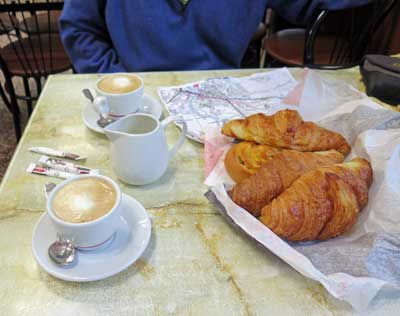
Having lingered as long as we dared (afraid of the heat to come), we set off, and as soon as we left the main road we were swallowed up in sunflowers.
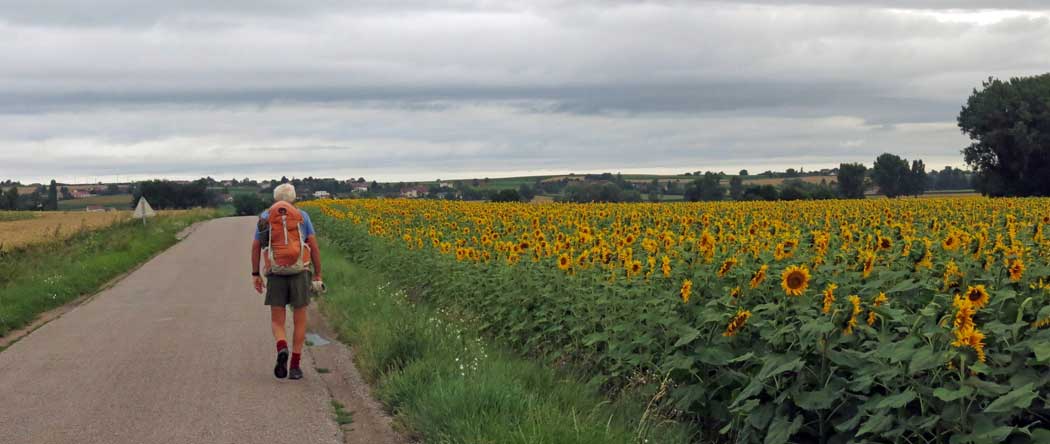
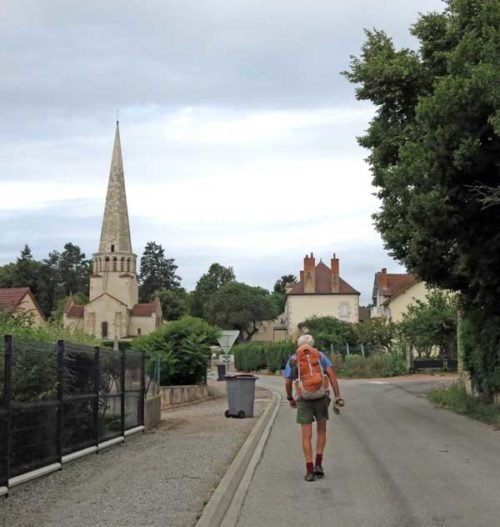
There was an ocean of them, all looking dutifully to the right, in the direction that the sun would have been if it had not been so cloudy.
There were fields of wheat as well, almost as brilliantly golden as the sunflowers.
In half an hour we arrived at the village of Saulcet, which was on a slight rise, and was dominated by a church with a pale, needle-sharp, octagonal steeple, visible from a long way off.
We later discovered that this was the traditional style of the old province of Bourbonnais (corresponding roughly to the modern department of Allier).
The slopes to the east were clothed in vines, as they had apparently been for centuries – the wine of Saulcet is quite famous.
A couple of kilometres of undulating road brought us to Verneuil-en-Bourbonnais.
This was even tinier than Saulcet, and looked more like an artists’ colony than a normal village.
The twisting lanes were lined with brown cottages, baskets of flowers, home-made sculptures, scarecrows, and murals.
A little square contained a cheerful-looking café, but as it was only
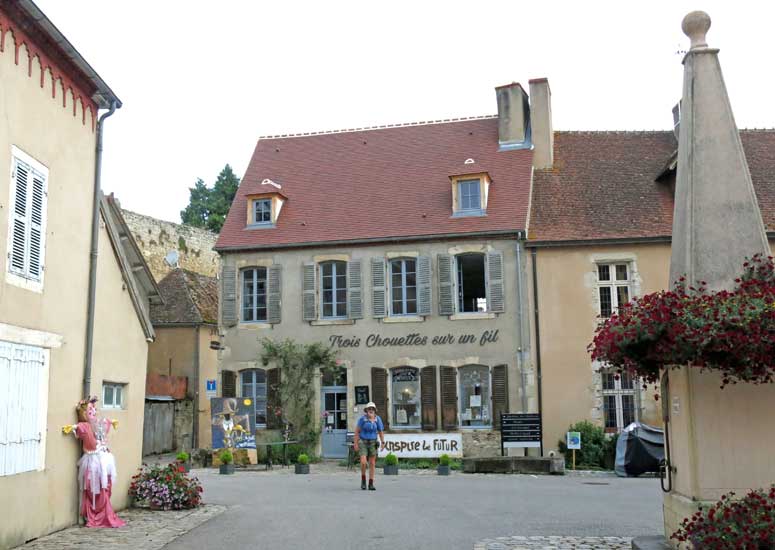
Pressing on, we went downhill, past a strange circular edifice that looked like an overgrown pigeonnier, then across a stream, after which we meandered along various small roads through the peaceful fields.
After a while we came to the village of Treban, where we looked forward to refreshments, as by then we had been walking for more than three hours.
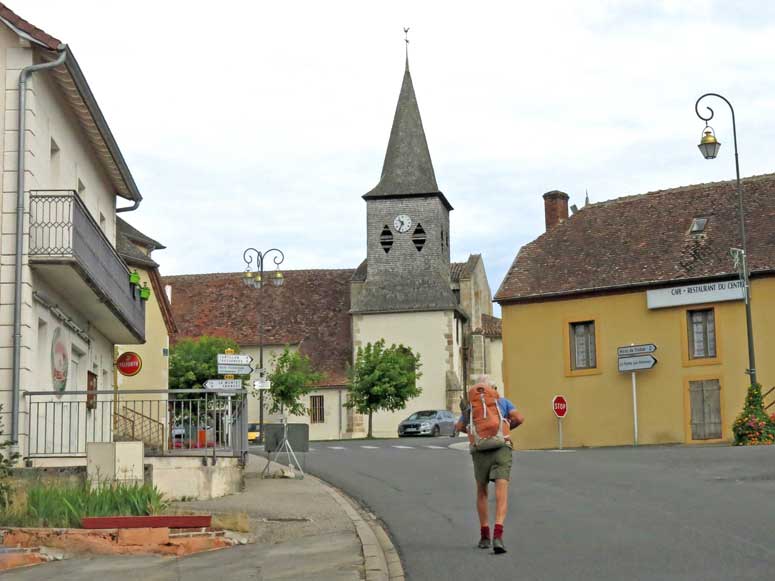
There was a large, mustard-coloured building with a sign saying “Café – Restaurant du Centre”, next to another sign saying “A Vendre” (for sale).
It was obviously closed, but across the road was a bar that looked more promising.
A second look revealed that it too was closed, so we had to make do with a swig of water.
We then carried on along the D33, and after about six kilometres of gentle walking we crossed the great canyon of the N79 on an overbridge, where trucks roared and screeched their way to far-off destinations in another universe.
Continuing our peaceful progress past nothing more exciting than herds of cows, we arrived at last at our destination, the village of Tronget, where we hoped very much to find the hotel open.
This time our hope was granted. It was lunch time and the dining room was busy, but we had coffee in the adjoining bar, and before going to the camping ground we made sure that the restaurant would be open in the evening.
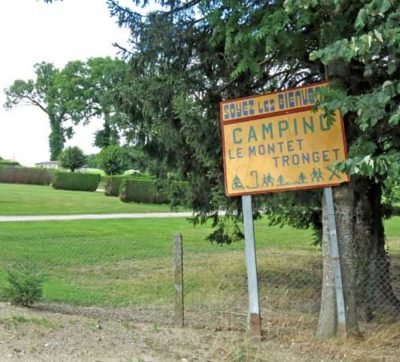
The camping ground was about a kilometre out of the village, on the road to the even smaller village of le Montet, and looked well cared-for, with its lawns mowed and its hedges neatly trimmed, but there was not a living soul in sight, nor even a tent or a vehicle.
The shower block was a simple shed, but the showers were hot and enjoyable.
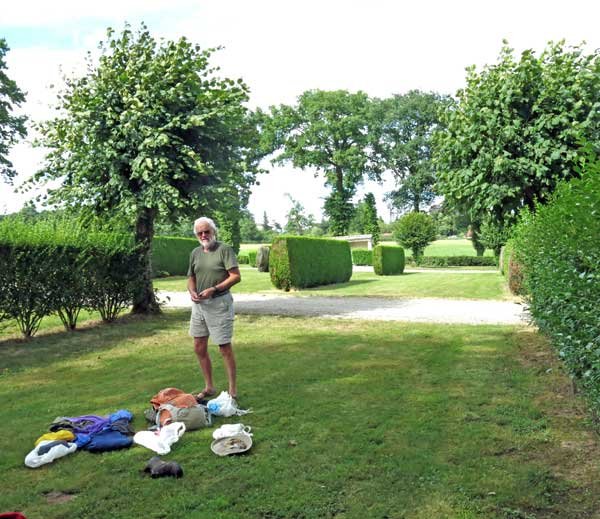
After that we lay down in the shade of a high cypress hedge for a nap.
As time went by, I began to dread the coming night, remembering the time in Chabanais when we had been by ourselves in a lonely camping ground, and had discovered as darkness fell that there was a creepy man lurking in the shower block.
I had been so spooked that we had ended up moving to the brightly-lit, crowded, bitumen square of the Aire de Camping Car, in the centre of town.
This time there was no such alternative, but there was the hotel. Keith kindly agreed that we could stay there for the night, so we packed up and went back to Tronget.

To our horror, the hotel man said that they were full, showing us the bookings list to prove his point. He had the annoying habit of screwing up his eyes whenever I said anything, as if I were difficult to understand – and perhaps I was.
He suggested various other hotels in different towns, not taking in the fact that we had no vehicle, but in the end he said that the evening bus to Montmarault, a big town that we had never heard of, about 17 km away, would arrive soon, and we could take our chances there.
The bus (there were only two per day) came to the door of the hotel at
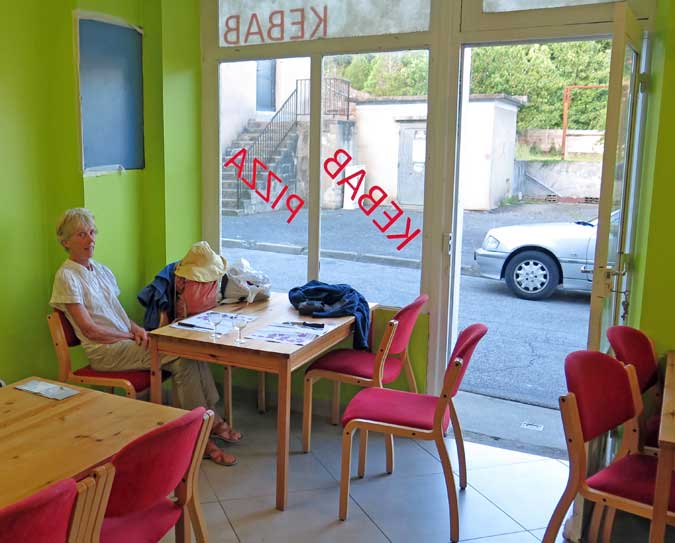
However, as we got off the bus we had noticed an Aire de Camping Car nearby, and we decided it would do nicely (although it was possibly not quite legal).
Meanwhile we needed to eat, so we followed our usual rule for finding the centre of a town – head for the church – and soon came to the main square.
Here we suffered another blow when we saw that the main restaurant was closed for renovations. The only other possibility was a broken-down kebab shop, so we reluctantly decided to eat there.
It was small, stuffy and hot, but the man in charge courteously walked us around the corner to their other premises, which were quite the reverse. This was where the good citizens of Montmarault were eating tonight, and the atmosphere was lively.
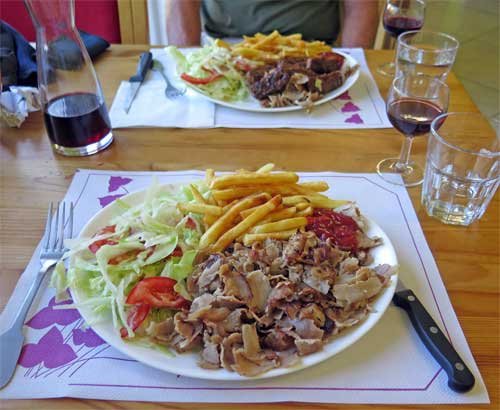
Across the street was an outdoor dining area but we preferred to stay indoors, as it was getting cold.
We had two ample dishes of middle-eastern food, deliciously spicy, with salad and chips, and red wine which we felt we deserved even more than usual.
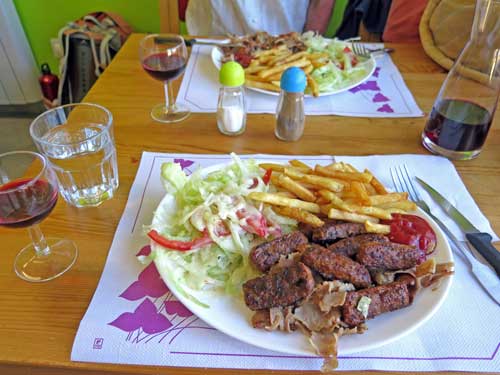
Near the main square, in an antique building, we found a public toilet, and it turned out to be the last word in modernity, with all the fittings new and sparklingly clean.
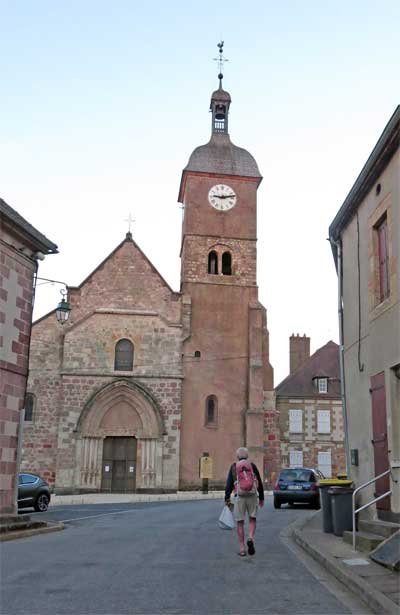
A short walk through some lanes took us back to the Aire de Camping Car, where people were retiring for the night.
There was one small patch of grass, on which a family had set up their table and chairs, and they were folding them up as we arrived, so we asked them if they would mind our occupying their patch for the night.
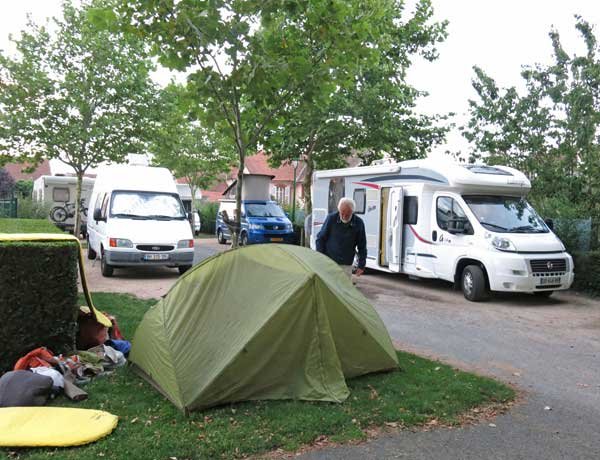
We promised we would be gone first thing in the morning, and they were delighted to help us. We shook hands all round before retiring.
Previous section: Digoin to St-Pourçain-sur-Sioule
